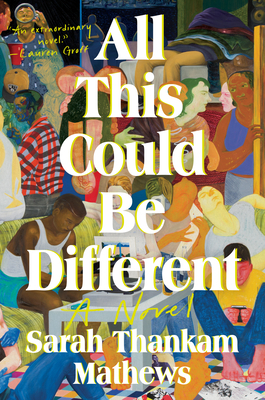All This Could Be Different, by Sarah Thankam Mathews

So I’ve read quite a few books in the last couple of years where I could describe the general vibe as “young people in their 20s are poor and unhappy, but they describe it beautifully. There’s a lot of conversation, but the writers hardly ever use quotation marks in these lengthy dialogue scenes.” Anything by Sally Rooney qualifies, obviously, and My Year of Rest and Relaxation, and another book Emma and I did a podcast on: Everyone In This Room Will Someday Be Dead, by Emily Austin. Quite a few more local examples as well. And I know that summary sounds flippant, but the fact is that list contains books I have really, really loved, as well as ones I felt “meh” about. This particular theme in literary fiction is definitely having a moment right now (not for the first time) and All This Could Be Different fits that category. I found it slow to get into at first but ended up really engaged and enjoying it a lot.
The 20-something in this story is Sneha, recent college graduate, the child of Indian immigrants to the US who have had to return to India, leaving Sneha in the US to finish college and hopefully get a good job. As the story starts she seems to be on the right track: a promising and decently-paying job that includes an apartment, a few friends in Milwaukee, where she lives, and good prospects for the future. Things unravel, of course, but even as the fragile threads holding Sneha’s life together come apart, she finds new things holding her together — bonds of resilient love she doesn’t always feel worthy of.
Sneha is an interesting character — definitely not immediately likeable, often judgemental and just plain wrong in her attitudes towards others, proud and stubborn, yet I found myself growing to care for her. As a white Canadian, I can’t judge whether the author’s portrayal of a South Asian immigrant experience in the US was authentic or not: I’ve read several reviews by South Asian people saying that yes, this book really captured their experience well, but others saying that they were frustrated by the ways in which the book still manages to centre whiteness — for example with Sneha’s desire to only date white women. For myself as a reader I can just say Sneha is living a life fundamentally different from mine in almost every way, and yet her experience felt real, and vivid, and I loved the way the novel ended.
Still could have used some quotations marks though — I’m never, ever going to be OK with the lack of them. But a great and compelling novel at least makes me not think too much about it.



